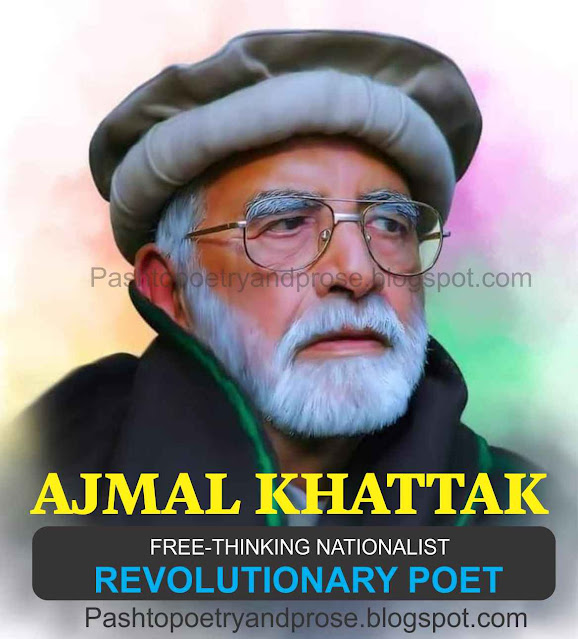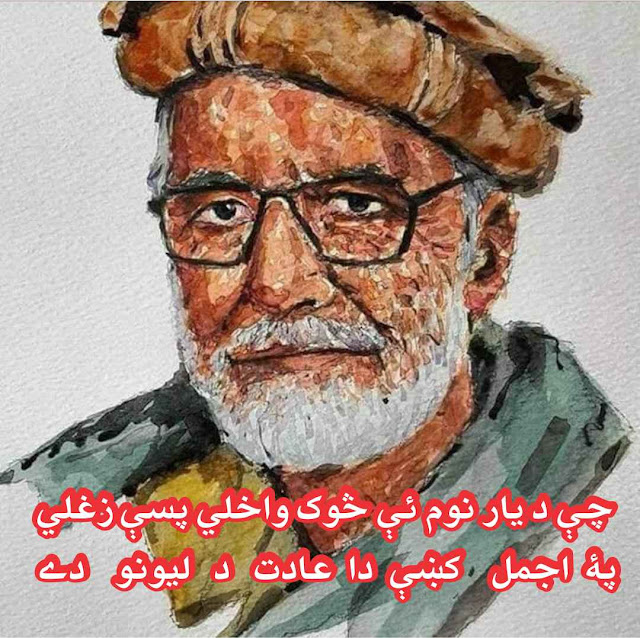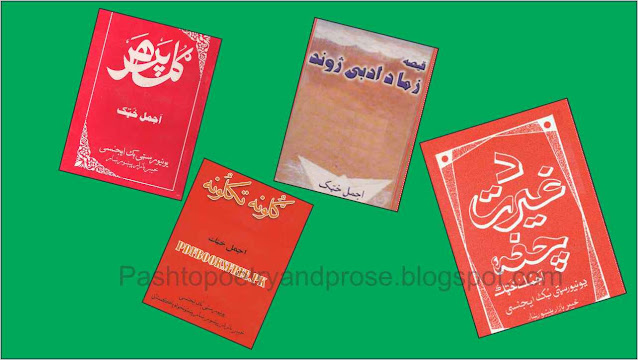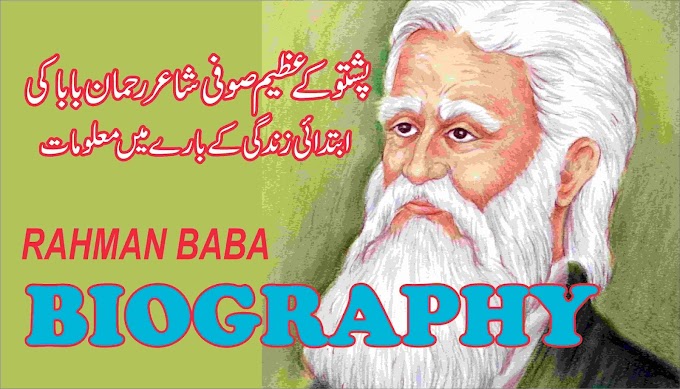Ajmal Khattak is a famous Pashto writer, politician and thinker.
 |
| ajmal khattak |
يه پښتنو
هير نۀ کړۍ دا ستاسو ملنګے خټک
وخت به درنه داسې ليونے ګورے بېا هم غواړي
Don't you know the different aspects of Ajmal Khattak's life? In this article you will read about different aspects of Ajmal Khattak Baba's life and you will also get to know his poetry.
Ajmal Khattak Baba:
Ajmal Khattak's name is well known in the world and his acquaintance is one of the most authoritative literary, political, journalistic and ideological references that have given Mr. Ajmal Khattak an inter-Afghan and inter-national fame, honour and status. Ajmal Khattak is not only a free-thinking nationalist revolutionary poet, writer, novelist, columnist and politician of Pashto language, but also a man of knowledge, wisdom and insight. From the “Khudai Khidmatgar movement” till now he has accepted himself as an active and indefatigable fighter, ideologue and leader in the politics of the present day.
Ajmal Khattak Baba was also associated with the Association
of Progressive Writers, was an active member of the Pashto Literary Jirga, پښتو
ادبي جرګې was also an active member and guide of the Olsi Adabi Jirga اولسي ادبي جرګې and Saho Lekwal
Maraka, ساهو ليکونکيو مرکې
Fellow Writers ملګري ليکوالان
and Bazm Adab Akora او بزم ادب اکوړې.
He started his career
as a school teacher and later joined Radio Pakistan. During his political life
and struggle, he spent 16 years in exile, during which time he lived in
Afghanistan as well as in the Commonwealth of Independent States of Russia and
Eastern Europe, where he wrote articles on various occasions He has read these
articles as a high standard in ceremonies and has participated in many
conferences, conventions and seminars and has spread his ideas all over the
world as a Pashtun intellectual.
Ajmal Khattak is the author of numerous prose and poetry
books, but his earliest collection of poetry, Ghairat Chagha, شعري
مجموعه " دغيرت چغه" has influenced a large generation of
Pashtuns and many progressive poets whose influence can still be seen today.
Ajmal Khattak has
given a new tone and color to modern Pashto poetry and has given new forms to
Pashto. They have created new works of poetry and prose. Apart from Pashto,
they were fluent in Urdu, English, Hindi, Arabic, Persian, Russian, German and
many other languages.
Ajmal Khattak was
born on 15 September 1925 in
the famous village of Akori in Nowshahr to Khushal Khan Khattak, a respected
Pashtun political, academic and literary family. His father name was Hikmat Kan
and he was a brother of seven sisters.
Ajmal Khattak's genealogy goes back to Khushal Khan Khattak
in the 10th generation. He received his primary education from the middle
school of his village and later enrolled at the Government High School in
Peshawar and joined the "Leave India"" هندوستان پريږدۍ
" movement in 1943, leaving his education incomplete Show In the
same year, he was employed by the government as a teacher in a school. He later
did his Masters in Persian.
 |
| Ajmal Khattak Poetry |
After the formation of Pakistan, he started working as a
scriptwriter in Radio Pakistan Peshawar and it is an honor for him to broadcast
the first national poem of Radio Pakistan Peshawar in the year 1947. Every week
a feature drama would be broadcast on the radio. During this time, he has
written some of the most popular programs, including "Sit in a glass
palace, don't sit on the rocks," "Awaaz Haq" and
"Hujra" are worth mentioning.
He was arrested on charges of founding the Pashtun League in
1935 and was kept in Pabbo and Nizampur for up to four months. Whenever he was
released on bail, he was again arrested on the same day in a public security
case and was lodged in Peshawar Jail. He spent several months in jail and when
he was released, he became the army chief in the Peshawar office of Anjam newspaper.
He resigned two years later and took part in practical politics. When the
incident at Liaquat Bagh in Rawalpindi took place, Ajmal Khattak went to
Afghanistan and spent 15 years in exile. He returned to the country in 1977 and
took part in the civil politics from the platform of Awami National Party. He
was elected a member of the National Assembly in 1990 and 1993 He was elected a
member of the Senate.
Ajmal Khattak, however, has spent most of his life in exile
in various countries, including Afghanistan, India, England, the United States,
Czechoslovakia, Hungary, Germany, Poland, Russia, China, Senegal, Greece and He
has also traveled to Turkey.
Khattak Saib's first published poem was published in 1937
and his first prose was published in 1935 in Pashtu Magazine.
Literary Work of Ajmal Khattak:
Ajmal Khattak's first book, The Da Ghairat Chagha, "د غيرت چغه "was
published in 1951. Prior to this, he had compiled and facilitated the work of
Abdul Hai Habibi, a Pashtun poet, in 1951, and later, in the year 2004, a book
called Jvand Chagha ژوند چغه
was published by the University Book Agency.
Ajmal Khattak has made great strides for his Pashtun nation
and has made such a great literary journey that in return for his literary
services, the government awarded him the Ahl-e-Qalam Qaumi Award by the Academy
of Literature Islamabad in 2007. Along with the award, he also gave Rs 500,000.
Ajmal Khattak returned the money to the Academy of Literature and told him to
give the money to poor poets.
The government of Pakistan later awarded a medal to Ajmal
Khattak, which he returned with great honor.
Ajmal Khattak's book "Da Ghairat Chagha"
" دغيرت چغه":
د خوشحال
له خاورې پورته يو نغمه شوم
بل مشال
پۀ اباسين او تاتره شوم
سرې پوهه
شوې ؟ د غيرت چغه سور اور وم
چې تا
څومره رانغاړلم سره لمبه شوم
This is the first collection of Ajmal Khattak's poetry which
was published by University Book Agency in 1958. Heartfelt feelings and
emotions are conveyed to the reader in the form of words and sounds. In the
preface or preface of the book, Ajmal Khattak writes:
"Da Ghairat Chagha is a collection of my poems, which contain
a few poems and verses that I have collected and present to the nation the
feeling of someone's tragic life that compelled me to write these poems."
Ajmal Khattak, the poet of change:
Pakistan's political history is full of constant mental
confusion and skepticism, but there are also clear examples of hope and light
thanks to national and progressive political movements that teach awakening and
movement to fallen and frustrated minds. The brightest star in the caravan of
the Pashtun Progressive National Movement is Ajmal Khattak, who in the course
of the Khudai Khidmatgar movement gave to Pashtun Zalmai the changes that took
place throughout the world as a result of the Great Soviet Revolution of
October and the Labor Revolution. Recognize the responsibility of class rights.
To achieve this, we have to spread knowledge not only in the field of political
struggle but also in the sacred language of literature. Ajmal Khattak Baba was
inspired by Kakaji Sanobar Hussain Momand, a great progressive leader.
فتوي پرې
لګولې غزلخوانه شاعرانو
پريښودے
دے خټک ددوي د شعر روايت
Fatwas issued by Ghazals
poets
Khattak has left the
tradition of their poetry
Ajmal Khattak's struggle:
Ajmal Khattak, the great guide of Pashto resistance politics
and literature, a man of oppression and prisons, a fighter for his nation, a
hope for a bright future for mankind, and a perpetual fighter for the
establishment of a revolutionary and non-class society. You go and his voice is
silenced forever but I am sure that the cries of his thoughts will never be
silenced.
He was the representative of the poor class and was the
master of all kinds of tyrants and tyrants who beat the rights of the poor and
used the poor nation for their own ends. Ajmal Khattak's struggle was to awaken
the political and social consciousness of his Pashtun nation and he They have
endured many hardships and prisons. He sought human paradise on earth and
devoted his entire life to it.
غټان
غټان نيکان نيکان پېدا دي
دوي خو
له ځايه جنتيان پيدا دي
ځۍ هغې
خوارو له جنت اوګټو
څوک چې
له موره دوزخيان پېدا دي
This is not just a poem but the aim of Ajmal Khattak's
struggle. In the Pashtun national movement, the book of honor is the place
which is the place of Maxim Gorky's famous novel "Mother" in the
Russian proletarian struggle. Ajmal Khattak, on the basis of his ideas,
cherished the legacy of Khushal Khan Khattak and, through his practical
struggle and struggle, honored and nurtured the great Baacha Khan.
It is an inescapable fact that the tyranny of history brings
about a change in personalities and attitudes and Ajmal Khattak could not
escape this kind of change but it is also a part of history that no one set a
price on Ajmal Khattak's head. Shaw and many people tried to get Ajmal Khattak
for money and silence him but all these people failed. Although Ajmal Khattak
remained active in many movements, he still lived in poverty and never sold his
thoughts and his nation's trust for money. And this poem is a practical proof
of what he says.
مونږ
ليوني کۀ څوک پۀ دار يروي
مونږ ته
د يار د زلفو تار ښکاري
او يا
داچې:
کۀ ظالم
مې ژبه غوڅه کړه تيره شوه
توره
څومره چې تيره شوه لا خوږه شوه
اوس کۀ
نر وي نو غوږونه دې خپل پرې کړي
چې زما
نغمه سړه نۀ شوله سره شوه
 |
| Ajmal Khattak Poetry |
Ajmal Khattak Baba had a long illness and when he was ill,
whenever he recited poems, he would give the impression that Pashtuns are
uniting and coming together, but unfortunately this is a very cruel plot of
history that From Khan Khattak's point of view, the talk of Pashtun unity has
remained empty till now and this aspiration has remained in the heart of every
Pashtun for a long time.
Ajmal Khattak Baba was well versed in world politics.
Whenever there was a war on the land of the Pashtun nation in the past decades,
he would say that these wars were in fact nothing more than imperialism and
monopoly and a complex of war industries. Don't give And he will say that a war
is being waged against the same savage and beastly people who continue to fight
on Pashtun soil. During the last days and nights of Ajmal Khattak Baba's life,
his body became very weak, so he said in a poem:
يار د
عمر راته تن او بدن زوړ کړو
بې وسۍ
مې هغه ګرم ژوندون سوړ کړو
پاکه
خدايه چې دا څۀ لوبه رااوشوه
زۀ د کټ
شومه وخت نوے ميدان جوړ کړو
او يا دا
چې
پۀ چم
کښې د غټانو يو ملنګ غوندې خټک وو
تپوس
اوکړۍ چې سپو خو ئې خوړلے چرته نۀ دے
نن ټول
سړي خوارۀ د کلي خپلو کښې لګيا دي
اے خوارو
رپېدا ئې کړۍ دا نن وخت د هغۀ دے
National Colors in Ajmal Khattak's Poetry:
د اجمل ختک پۀ شاعرۍ کښې قامي رنګونه:
Every human being's thought is like a mirror due to which
all the objects of his environment see his actions and deeds through his senses
and emotions but the mirror of a poet's feeling is much brighter than the
mirror of the common man's feeling. And to be clear, what the poet feels is not
felt by the common man because the poet shares what he feels with other human
beings by force of his poetic ability and presents it to the society. And it is
the perfection of the poet to give beautiful colors to his society to share
with the society in the language of his poetry and make it so that his poet's
message easily touches the hearts of other common people.
The Pashtuns like
other poets like Mr. Ajmal Khattak like his grandfather Khushal Khan Khattak
had got this privilege of national and national feeling, and in all walks of
life he made all kinds of sacrifices for the service and development of his
Pashtun nation. Ajmal Baba, whenever he saw his Pashtun nation in the flames of
oppression and tyranny, he has suffered a lot due to his pride and honor and
has become very upset. And that is why the song of his zeal and courage has
become even hotter.
کۀ ظالم
مې ژبه غوڅه کړه تيره شوه
توره
څومره چې تيره شوه لا خوږه شوه
If the oppressor cuts
my tongue, it is gone
The sword became
sweeter as it passed
In Ajmal Baba's thoughts, the colors of nationalism and
friendship of the Pashtun homeland are reflected in his body language.
دا چې تا
يو پيدا کړي د غېرت نه ډک مړونه
دا خورې
ورې ټبرې دا نس نس خؤارۀ خيلونه
د يو لاس
دا خورې ګوتې رايوځائے پۀ مينه بېا کړې
لويه
خدايه لويه خدايه دا تيارې پۀ مونږ رڼا کړې
Ajmal Baba wanted to end the darkness of poverty of his
nation in the light of his thoughts and he has taught the whole Pashtun nation
to face the situation.
اے سرتور
سر بربنډ لغړ پښتونه
اوږيه
تږيه خړ پړ پښتونه
ستا د
خيرن سر نه تاجونه زار شه
ستا د
خولو ځني عطرونه زار شه
Ajmal Khattak Baba was very much interested in the welfare
of the Pashtun nation and the Pashtun nation stood against the aggression and
exploitation of rights. He was a believer in the unity of all humanity and
wanted a prosperous life in the flower veins of his Pashtun nation.
د ګل
رګونو کښې چې ژوند اوسېږي نُور اوسېږي
يا د
انګور غنچه کښې مينه او سرور اوسېږي
ښکلي
هيواد کښې د پښتون دغسې ژوند غواړم
مينه
خائست او ورورولي ډکه د خوند غواړم
In a society where justice and fairness end, the inhabitants
of the Haga society become thirsty for each other's blood, deprived of insanity
and whose aim is purely greed. The devastating state of a society that every
sensible person sees is upsetting. When Ajmal Khattak Baba looks at the decline
of Pashtun society, he longs for peace, love and harmony in Pashtun society and
for justice to be established:
اے زماني
ستا رنګينو ته سلام
دا ستا
خوږو او ستا ترخو ته سلام
بس دے
ستا زړۀ کقې يو طوفان جوړوم
ځان ته د
ځان غوندې جهان جوړوم
Every nationalist and national thinker seeks the sovereignty
of his people on his own soil, and in a region where the nation is doomed and
the power is in the hands of another, those nations cannot develop and suffer
great loss. ۔ Ajmal Baba in his poems
has given place to the subjects of his sovereignty and authority over his land.
زمانې تا
کۀ فرغوني راخستې
زۀ درته
بيا يد بيضا لټووم
د
جادوګرو جادو ملک اونيو
زۀ ورته
بيا هغه امسا لټوم
 |
| Ajmal Khattak Books |
Ajmal Khattak Baba's position in contemporary literature:
Ajmal Khattak Baba is one of the important personalities in
contemporary Pashto literature. Ajmal Khattak Baba possesses many qualities and
has accomplished many things. Therefore, the position of Ajmal Khattak can be
considered as a fundamental position in contemporary Pashto literature. Ajmal
Khattak Baba has worked in various genres of Pashto literature such as drama,
fiction, novel, reportage, poetry, prose, and literary travelogue. He has
brought a lot of benefits to Pashto literature.
When Ajmal Khattak Baba started reciting poetry, the
"Khudai Khidmatgar" movement in Pakhtunkhwa under the leadership of
Baacha Khan was in full swing and this movement gave the greatest number of
poets to Pashto literature. The list of names is too long. Ajmal Khattak Baba
is also a big name in this list. Ajmal Khattak Baba was a young man at that
time. He started writing poetry under this influence and in a very short time
he reached a place where the whole Pashtun nation was proud of. Apart from the
influence of Baacha Khan's movement, the influence of progressive literary
organizations of India was also destroyed and this was the reason why Ajmal
Baba's thought was made bright and beautiful. Afrasiab Khattak, a Pashto
political scholar and scholar, wrote about Ajmal Baba: The group consisted of
Faiz Ahmad Faiz, Faraq Gorkhapuri, Munshi Premchand, Josh Malihabadi, Jaggar
Muradabadi, Ahmad Nadeem Qasimi, Israr-ul-Haq Majaz, and many others. Let this
movement unite with all the freedom-loving people of the world and let this
movement have a profound effect on the literary consciousness in the areas of
Kozai Pakhtunkhwa as well. Revolutionary and progressive writers like Latif
Wahmi were part of this movement. "
Ajmal Khattak Baba not only changed the style and style of
Pashto poetry in poetry but also brought a great change in the light of Ajmal
Baba's personality in politics. Ajmal Khattak's book Ghairat Chagha is a
masterpiece of a unique style. Another of his books is "Flower
Tackles", a book of ghazals in which he also translated his contemporary
literature in the form of ghazals. In short, Ajmal Khattak's position plays a
pivotal role in contemporary Pashto literature. Ajmal Khattak is a man of many
talents and has done remarkable work in various genres of literature. Read this
poem about Ajmal Khattak's position in contemporary literature:
ځان مې
پۀ در کښې کړو درته خاوري
پۀ خټ خټ
خآندې ژړا مې نۀ اورې
يو ورځ
به واورې چې خټک مړ شو
کۀ نۀ
اورې نۀ اورې دا خو بۀ واورې
I put myself in you
I can't hear the
laughter in the mud
One day you will
hear that Khattak is dead
If you don't hear
it, you will hear it
Ajmal Khattak a Poet of poem:
Ajmal Khattak's name is well known among the writers of the
third world of the twentieth century, whether it is the movement for
independence from the British or the progressive movement. Don't give and
especially if we are talking about poetry, Ajmal Khattak has done a lot of work
in poetry and through poetry and literature he has fulfilled his duty of
serving his nation and his land in a very good way. Ajmal Khattak was basically
a rebellious person and this tendency is also seen in his poetry. Among the
Pashto poets, Ghani Khan was a rebellious and beloved poet of his Pashtun
nation but the style and style of Ajmal Baba is very different from that of
Ghani Khan. If we look at the history of Pashto literature, Ajmal Baba gave a
lot of strength to Pashto poetry and perhaps such a garden thought was needed
for the development of Pashto poetry. In Ajmal Baba's poems, the theme of
guidance of his nation and also the movement to raise voice against the
oppressive government, to give social consciousness to the Pashtun society, to
fight against the oppressive social and class system, against the exploitative
forces like Wall Standing and Darang and many other subjects are the main aim
and center of Ajmal Khattak's poetry. Ajmal Khattak was an innate genius and
genius. He put what he saw and felt into his poetry in a very artistic way and
presented it to his nation. Weak people like Gujjar, farmer, laborer or forced
human being want to express their problems and compulsions in their poems so
they first create a complete picture for the egg in the mind of their reader
and then very artistically convey that purpose to the mind of the reader.
Personality of Ajmal Khattak:
Ajmal Khattak is known throughout Pakhtunkhwa as a great
national leader, nationalist, nationalist leader and a great poet and writer.
They are aware of perfection. Ajmal Khattak has maintained his passion for
knowledge in all circumstances, he has learned from everyone and he was a
teacher himself. His hobby of books and poetry was not from his childhood and
he had created Bazm Adab in his own area to which poets and writers would come
and Ajmal Baba would also attend such gatherings and programs.
Ajmal Khattak and his book "Da Ghairat Chagha":
The characteristic of the Pashtun nation in the history of
the world is that the Pashtun nation has never left its land and its culture
and language to any other tyrant or occupier. Whenever an invader invades Pashtun
land or culture, men and women, young and old, of the Pashtun nation come out
to confront the occupier and thwart his attempt to seize it. Give This is also
the reason why most of the enemies have not been directly hostile and at war
with the Pashtun nation, but have secretly tried to bring discord and
selfishness in this nation, and this is also the reason why the Pashtun nation
These conspiracies have led to disunity and factionalism.
Ajmal Khattak is also a resident of this Pashtun land. Whenever
the British planned and invaded the Pashtun lands, they occupied most of the
present Pakistan and when they reached the Pashtun areas, they fought fierce
battles with the Pashtun people. The British government was also surprised. The
Pashtun nation is a very strange nation, how can it fight against a large army
of the British army without arms? And the role of the writers is very important
and one of these writers was Ajmal Baba who used all his abilities in the
success of the movement and gave all kinds of help and friendship to Baacha
Khan Baba. Ajmal Baba's book of poetry "Ghairat Chagha" has been
written under the influence of her struggle in which Ajmal Baba has described
the issues of awakening of Pashtun nation and movement against the occupying
colonialism and his Pashtun nation. They are standing in front. Her book is a
very authoritative work in every respect.
In short, there are many aspects of Ajmal Khattak Baba's
life and if all these aspects of Ajmal Khattak Baba's life were discussed then
a whole book would be written on it. In this post I have tried to present to
you the important aspects of Ajmal Baba's life and summarize it. If you have
any important information about the life and art of Ajmal Khattak Baba, please
share it with us in the comments section, I look forward to hearing from you.
And I hope you enjoy reading this information.
In future posts I
will write about other aspects of Ajmal Baba's life and I will share it with
you as long as you take good, care of yourself and your environment.










0 Comments
Please do not enter any spam link in the comment box
Emoji